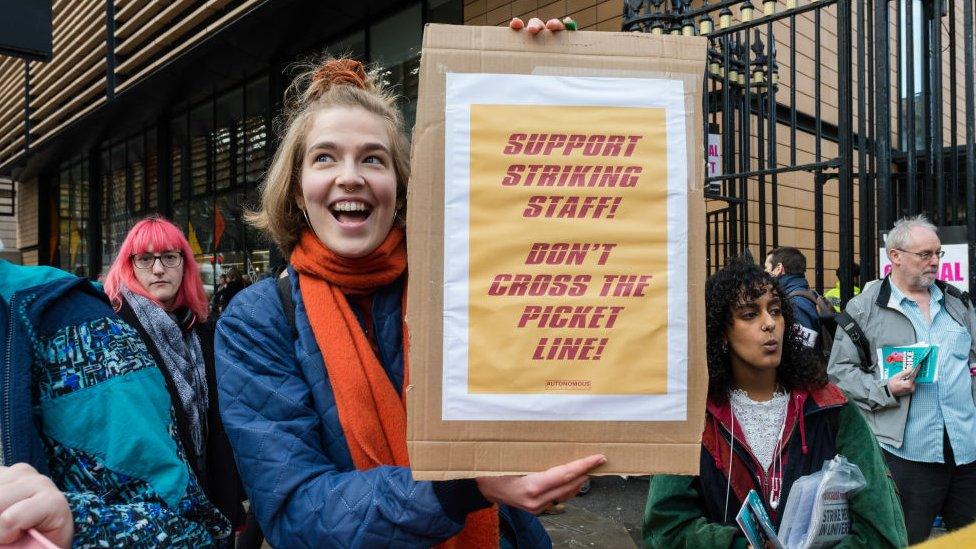Cambridge University students 'in limbo' over marking row
- Published
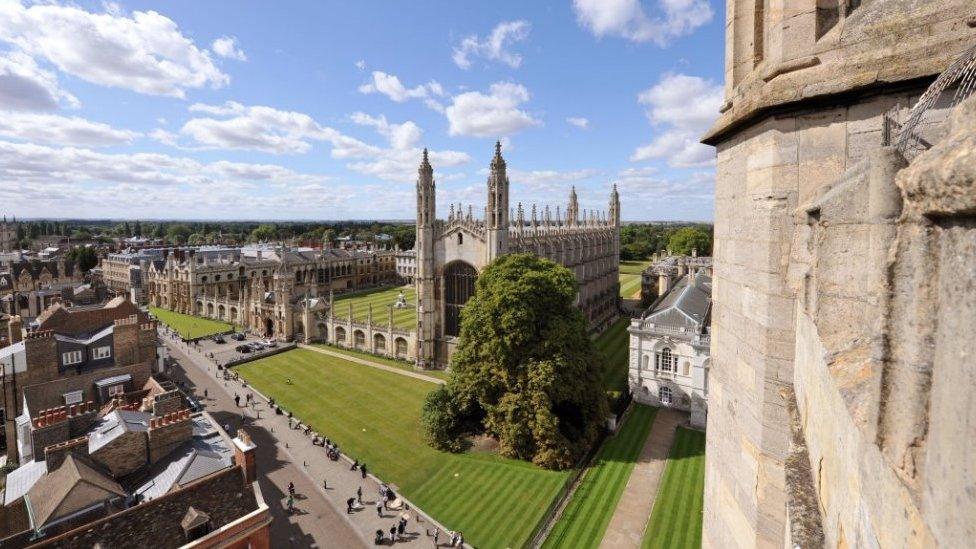
Students at Cambridge University are among those who have been affected
The University of Cambridge says students will not be able to graduate until all their work has been marked, due to an ongoing boycott by staff. The national dispute, over pay and working conditions, is affecting 145 UK universities. What impact is it having on students in Cambridge?

'We've been kept in the dark'
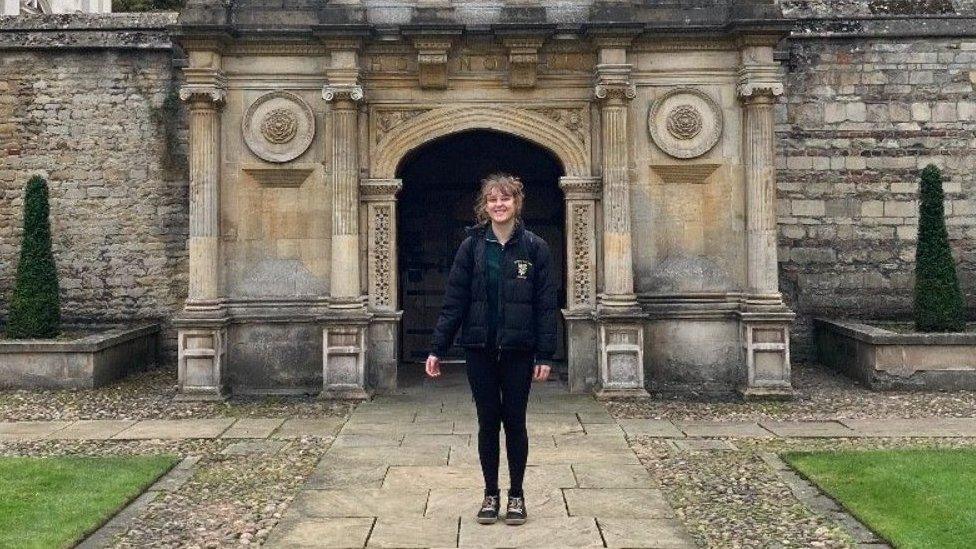
Michelle Crees says students do not know what to expect
For third-year engineering student Michelle Crees, there is a lack of clarity over what to expect over the coming weeks.
"We're in this period of stasis, where we just don't know which way it's going to go and are just waiting for someone to say something."
She was planning to start a fourth year at Cambridge, studying for an integrated master's degree - but at the moment, she has no idea when or if she will be accepted on to this next stage of her course.
"We're very unsure about whether to start looking for accommodation and things next year," she says.
"We've been kept in the dark about what this means for us personally.
"I'm just hoping I'll be here next year."
Like many finishing their degrees this year, both Michelle's final year at school and her first year at university were impacted heavily by Covid restrictions.
"It feels like a full circle moment in some ways," she says.
"We didn't get to graduate at the end of secondary school; we had our first year without any sort of celebrations - so it's only fitting that we don't get to graduate either."

'Left in limbo'
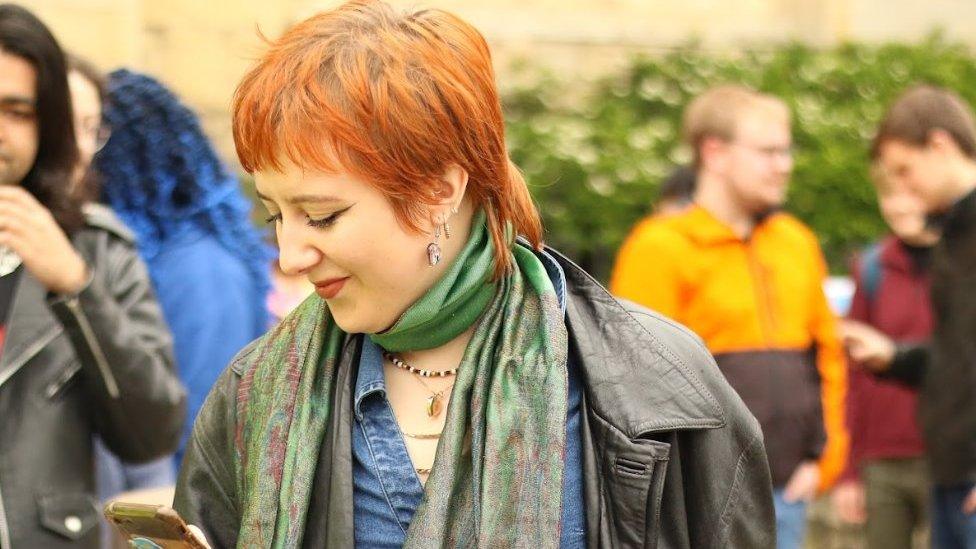
Bella Cross says students are "in limbo" but she wants her work to be marked "by the right people"
"We've really been through it," says final-year history and politics student Bella Cross.
"I remember getting the news that A-levels were cancelled and crying because I'd already been doing all of my revision… then we had to come to university where it was literally illegal for us to socialise, and that was really detrimental to so many people's mental health."
She started an open letter to senior figures at the university as part of a student campaign, asking for the matter to be settled and for further clarity for final-year students.
Some 1,400 current Cambridge students had signed by the time the letter was submitted at the end of May.
Bella says she and her peers have been "left in this kind of limbo".
"Obviously it's devastating that we don't get to leave with the grades, but I am ultimately really glad that Cambridge hasn't put the mitigations in place, because I want my work to be marked fairly and by the right people, so I can leave with a grade that is actually reflective of all the hard work I put in," she adds.

'A domino effect'
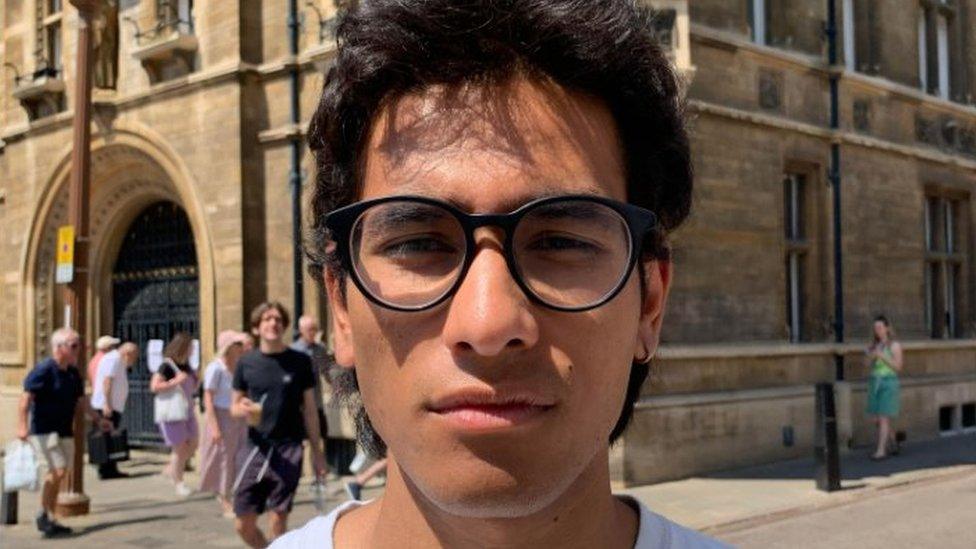
Thaqif Aris does not know if his job offer will still be open if he does not get his graduation certificate
For Thaqif Aris, an international student in his final year studying history and politics, his pending grade could make the difference to whether or not he is employed this autumn.
He has been offered a job back home in Malaysia, but it is contingent on achieving a certain grade.
"I feel like something has been taken away from me, even though I've done nothing wrong," he says.
"The university has said it will send a letter to our employer, but I'm not sure if that's enough to prove that I will reach the grade."
But Thaqif is concerned about the long-term effect the situation could have.
"There could be a domino effect for other years. I'm wondering how this will affect the image of the university and student experience.
"This is just the tip of the iceberg, though. I think deeper issues will come to the fore if nothing is negotiated."

The marking boycott by members of the University and College Union (UCU) began in April, affecting 145 UK institutions.
The University and Colleges Employers' Association (UCEA) carries out pay negotiations with higher education unions including UCU.
It said an improved pay deal for 2023-24 worth between 5% and 8% was the highest pay offer of its kind in nearly 20 years.
Unions claimed it was a real-terms "pay cut", with 56% of participating UCU members voting to reject the offer.
Despite talks stalling, the UCEA has advised universities to implement the 2023-24 pay uplift, backdated to February.
A joint statement, external from University of Cambridge and the UCU, said it was "regrettable" that the national pay and conditions dispute had resulted in a marking boycott, and called for talks between the UCEA and UCU to resume.
"No-one wants students to suffer further, and we are deeply sympathetic to the strength of feeling in our student body," it said.
"For many, including staff, this is a stressful and anxious time."
UCU's Cambridge branch president Michael Abberton added that members had received "fantastic support" from students.
UCEA chief executive Raj Jethwa said: "We spent a lot of time working with the unions through ACAS, we thought we reached an agreement… but they ultimately rejected that when they took it to their members, so we are in dispute now with the unions.
"Cambridge has called for talks to recommence and we totally support that - we worked through ACAS and we've got terms of reference as the basis for further negotiations.
"We believed UCU had also accepted those… our members are more than willing to take up those negotiations on the basis of those terms of reference and we only ask that UCU does the same."

Follow East of England news on Facebook, external, Instagram, external and Twitter, external. Got a story? Email eastofenglandnews@bbc.co.uk or WhatsApp us on 0800 169 1830
Related topics
- Published20 October 2023
